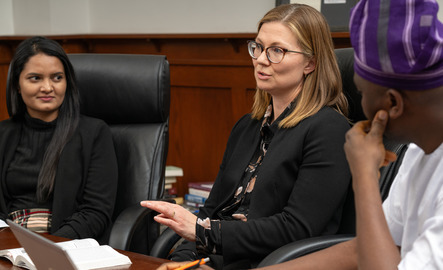About The European Studies Minor
This 18-credit-hour minor guides students through the study of modern European history,
politics and society. It’s a wonderful addition to the International Studies degree
or any other regionally focused program.
Students choose which courses they’d like to take from a long list of approved options,
making this minor highly customizable. All students have the option to include foreign
language and study abroad components. Students may additionally choose to focus their
studies on Europe as a whole or an individual country.
Students must be enrolled in an undergraduate degree program to pursue the European
studies minor.

The School of Politics, Public Affairs and International Studies is home to many accomplished faculty members with years of subject matter expertise.
- Dr. Stephanie Anderson is the head of the School of Politics, Public Affairs and International Studies. She specializes in European Union security policies.
- Ruth Bjorkenwall teaches courses on security and social change with a focus on Nordic countries and Northern Europe.
- Dr. Nicholas Crane’s work focuses on Turkey, including Turkey’s key role in Eurasian politics.
- Dr. Nevin Aiken focuses on conflict and post-conflict processes and has led courses on conflict resolution in Northern Ireland.

What can you do with a European studies minor?
A European Studies minor can enhance your global perspective and open doors to careers in international business, diplomacy, education, tourism, translation, journalism or nonprofit and cultural work. It pairs well with majors like political science, history, languages, economics or international studies and can also strengthen applications for graduate programs or law school with an international focus.
Our grads pursue many different career paths based on their interests, internship experiences and preferences. Career options include nonprofit leadership, international law, diplomatic work, corporate social responsibility and analysis for federal agencies, among many others.
UW’s European studies grads excel in a variety of settings, including:
- Nonprofit organizations
- Federal agencies
- Universities
- Law firms
- Embassies
- Private firms
Yes, a European studies minor is great preparation for graduate school. It builds strong skills in research, critical thinking, writing and cross-cultural understanding—key strengths for advanced study in fields like international relations, history, political science, law or global studies. It also shows a broad, globally minded perspective that appeals to many graduate programs.
In European studies, you explore the history, politics, languages, cultures and societies of Europe. Courses include topics like European history, literature, philosophy, international relations, political systems, art and film. You may also study a European language such as French, German or Spanish. Students are additionally encouraged to study abroad to deepen their understanding of the region.
Take Your Studies Abroad
Enhance your European studies minor with a study abroad experience that brings history, culture and language to life. Whether you're walking ancient streets, practicing your language skills or exploring international politics firsthand, studying in Europe adds depth and global perspective to your education.
"A European Studies minor provides interdisciplinary insight into Europe's social histories, cultural landscapes, political negotiations, and economic circuits. Expertise in the region and regional affairs also help students understand and strategically engage with a globalized world in which Europe has historically played a leading role."
- Dr. Nicholas Crane | Associate Professor | Director of International Studies Undergraduate Program


